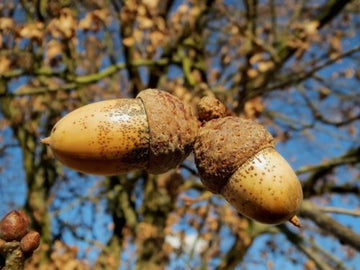Oak trees are fairly common on farm properties. Acorns are produced by oak trees in autumn, and both acorns and leaves fall at that time of year. Many animals depend on acorns for their nutritional needs, but some animals, such as horses, cattle, goats, and sheep are sensitive to the toxins in acorns. Acorn toxicity in horses is caused by consuming large amounts of acorns. Regardless, they are harmless when consumed in scant amounts, especially when combined with the normal roughage of hay and grass.
Fact: Cattle are much more sensitive to acorn toxins than horses.

What is the cause?
In horses, tannins in acorns and leaves bind to proteins in the lining of the digestive tract and the microflora of the gut, causing damage to cells, while toxic metabolites trigger kidney and liver damage.
What are the Symptoms?
- Constipation
- Anorexia
- Colic
- Blood in the urine
- Kidney damage
- Dehydration
- Edema (fluid buildup) in the neck, and abdomen
- Loss of appetite
- Depression
It is difficult to diagnose acorn poisoning in horses and there is no medicine specifically for Acorn poisoning, which makes things even harder. Nonetheless, activated charcoal has been known to be an effective treatment for acorn poisoning. If given immediately after acorn ingestion, it can absorb toxins in the gut and allow them to be excreted from the system. During this time, the horse should have IV fluid therapy to help with dehydration as well.
The best method for treatment is always to prevent it. The only way to protect your horse from acorn poisoning is by fencing off oak tree areas and keeping your horse out of the wind path of falling acorns and leaves.























